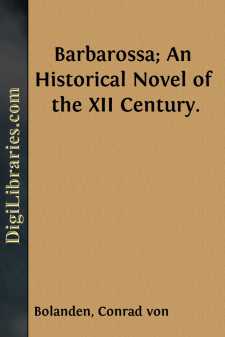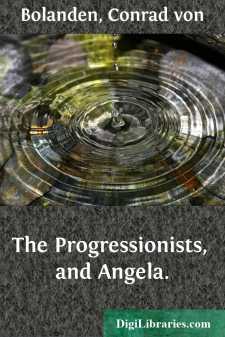Categories
- Antiques & Collectibles 13
- Architecture 36
- Art 48
- Bibles 22
- Biography & Autobiography 813
- Body, Mind & Spirit 142
- Business & Economics 28
- Children's Books 15
- Children's Fiction 12
- Computers 4
- Cooking 94
- Crafts & Hobbies 4
- Drama 346
- Education 46
- Family & Relationships 57
- Fiction 11829
- Games 19
- Gardening 17
- Health & Fitness 34
- History 1377
- House & Home 1
- Humor 147
- Juvenile Fiction 1873
- Juvenile Nonfiction 202
- Language Arts & Disciplines 88
- Law 16
- Literary Collections 686
- Literary Criticism 179
- Mathematics 13
- Medical 41
- Music 40
- Nature 179
- Non-Classifiable 1768
- Performing Arts 7
- Periodicals 1453
- Philosophy 64
- Photography 2
- Poetry 896
- Political Science 203
- Psychology 42
- Reference 154
- Religion 513
- Science 126
- Self-Help 84
- Social Science 81
- Sports & Recreation 34
- Study Aids 3
- Technology & Engineering 59
- Transportation 23
- Travel 463
- True Crime 29
Barbarossa; An Historical Novel of the XII Century.
Description:
Excerpt
The pleasant historical novel which is now offered to the American public, refers to a period of history very much misrepresented, though very frequently written about, or at least referred to by popular writers. In the contest between Pope Alexander III. and the Emperor Frederic Barbarossa, we see a very important phase of the long struggle between the spiritual and civil power; a struggle, in which was fought the battle of real liberty, and real Christian civilization, against brute force and Pagan tyranny. Perhaps nothing has been so badly understood as the real casus belli in this struggle of centuries. Most non-Catholics firmly believe that the conflict arose from an effort of the Church to obtain universal dominion; to make princes and people bow to her behests on all matters; to reduce the civil ruler to the condition of a mere lieutenant of the Pontiff, to be removed at will by that spiritual autocrat, and, of course, to improve the condition of her own officials; securing for them the choicest and fairest portions of all the good things of the earth. The Emperors and Kings who were hostile to the Church are painted, on the other hand, as the assertors of civil liberty, the William Tells that refused to salute the tyrant's cap, even though it were called a tiara; the heroes, that in a superstitious age braved the terrors of excommunication, rather than sink into a degraded servitude, to the heartless ambition of churchmen.
Nothing can be farther from the truth than this view of the subject. In reality, what the Church fought for during this long struggle was--not power, but--liberty. She refused to admit that she was a corporation existing by the permission, or the creation of the State. She claimed to be a spiritual society, existing by the fiat of the will of God, entirely independent in her own sphere, having a government of her own; executive, legislative, and judicial rights and duties of her own; an end of her own, far above and beyond the affairs of this world. It was for this liberty and independence that her martyrs had died, her confessors languished in prison, her saints prayed and suffered. When the rulers of the world became Christian, the difficulties in the way of her liberty did not cease; they only assumed a new form. Open opposition became oppression, under the specious name of protection; and the State made every effort to restrain and shackle a power, the indomitable energy and dauntless courage of which it imagined it had reason to fear.
This was, indeed, one of the "empty" things which the sons of men, crafty in their own generation, allow themselves to say when they speak of spiritual things. The unrestrained power of the city of God on earth cannot hinder, or in any way interfere with the true development of the earthly commonwealth. Truth, morality, justice, are the surest foundations of civil peace, liberty, and prosperity. Under the pretence of defending their rights and those of their people, civil rulers have endeavored to subjugate the Church, enslave her ministers, make her, in a word, merely a piece of government machinery, to register their decrees, and enforce them with her anathemas. Had they succeeded, the only bulwark of freedom would have been swept away; for as man has no right higher or holier than freedom of conscience, that is, freedom to serve God rather than man, had this right been sacrificed to the imperious demands of the civil power, other rights less important, such as those which constitute civil liberty, would have been lost with it.
Thus the medieval Pontiffs--living in exile, wandering from one city to another, often in prison, rarely suffered to live in peace--were the martyrs of the highest and truest freedom. To their indomitable courage, untiring perseverance, and clear-sighted intelligence, we owe whatever idea of true freedom (that is of the existence of the rights of man independently of the permission, toleration, or concession of the civil power) still survives in modern society.
These fundamental truths are well illustrated in the following pages. The special period of history chosen, serves to show clearly the real points of dispute. Even Voltaire acknowledged that it was the "wisdom" of Alexander III. that triumphed over the "violence" of Barbarossa. As the same writer observes:--"Alexander revived the rights of the people and suppressed the crimes of Kings." A Pontiff to whom such testimony is borne by Voltaire, cannot fairly be accused of ambitious designs....



